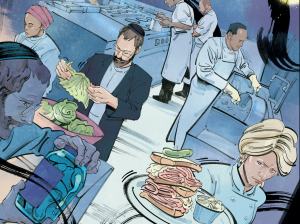There’s a passage from a May 25 Michelle Goldberg New York Times op-ed I have not been able to stop thinking about. It’s about “what [Elon] Musk’s foray into politics accomplished,” namely huge cuts to US foreign aid:
“Brooke Nichols, an associate professor of global health at Boston University, has estimated that these cuts have already resulted in about 300,000 deaths, most of them of children, and will most likely lead to significantly more by the end of the year.”
I had to read the passage several times to take in the enormity of these numbers. Musk only came on the political scene several months ago. “300,000 deaths, most of them of children.”
There is a long history of defenders of Israel responding to criticisms by asking, what about Sudan? What about Syria? As in, why does man-made disaster where Israel is not in any way implicated get less attention? I am not, here, in this article, addressing that line of argument. What I’m doing is trying to capture the unmooring experience of realizing I’m formulating an argument along those lines, but about my country of origin.
I find myself wondering the relative amounts of headspace taken up by Israel’s actions, as opposed to those of the United States government. The angst I am by no means alone in experiencing—see British-American Jewish writer Hadley Freeman’s brilliant The Times (UK) column on “hand-wringing liberal westerners” of whom she is one, and I am one. Why do I don’t-look-away myself when it comes to Gaza, most recently via Suzy Hansen’s New York magazine cover story, but receive this with the ‘well horrible things are always happening somewhere’ shrug?
I am American (and more recently, Canadian), but not Israeli. I work in Canadian Jewish media, not in pro-Israel activism. I think Israel’s military actions, even the ones I don’t see as just, come from a place or at the very least a pretext of fighting an existential threat, whereas what existential threat is the US facing when it cuts off foreign aid? Arguably what America is up to here is worse. Is it about which gets more media coverage? Is it that anything terrible that happens in Gaza gets attributed not only to Israel as versus Hamas, but to world Jewry?
***
I was not a military-strategy expert on Oct. 6, and have not spent the time since Oct. 7 becoming one. I don’t know what the correct course of action would have been after such a devastating attack, against an enemy like Hamas, a very different enemy than Iran. I know that misinformation abounds, and that suffering in Gaza cannot solely be attributed to Israel’s own actions. I also see the same photos everyone else does of miserable Gazans and much as I might wish I could will myself into thinking these were AI-generated, or Hamas propaganda, or actually photos from a different conflict, alas, I am not.
I think, once you’ve got former Israeli prime minister Ehud Olmert writing a Haaretz op-ed entitled, “Enough Is Enough. Israel Is Committing War Crimes,” it becomes hard to classify even (some) harsh criticisms of Israel’s actions in Gaza as an anti-Israel position. If you’re rooting for Israel, you ought to be rooting for Israel to have made—or, given that time travel is impossible, to start making—some different choices.
While ‘look at how mean Israel is’ commentary abounds, there doesn’t seem to be much analysis of why there hasn’t been a worldwide campaign on the part of literally everyone other than Israeli government officials demanding that Israel leave Gaza alone. When I think about this, what I return to is that the ‘leave Gaza alone’-type requests have, since Oct. 7, so often come bundled with a demand that Israel itself cease to exist. The people most vocally mad at how Israel has been defending itself are, all too often, ones who object to it doing so at all, in any manner.
Put another way: You could think of the people who spent October of 2023 focused on the excesses of Israeli countermeasures as prescient. Or you could remember that for anyone distraught over the Oct. 7 attacks, the idea that Israel ought to be encouraged to chill, at that point in time, seemed effectively like asking a nation to self-destruct in a manner that none would do in that circumstance.
And this is where Jews—some of us, or, I will just speak for myself—differ from non-Jews in making sense of atrocities in Gaza. It’s not that I look at them and think, well who cares, these are Palestinians suffering. I’m not wired in some more callous way. It’s that I hold two thoughts in my mind: an urgent desire to see that suffering end, and a hope (hope understates this) that the resolution is not, in effect, the destruction of the Jewish people. This is not a strange neurotic fear, when you consider not just the Holocaust but Oct. 7, Boulder, and the fact that the moment any social media platform goes cesspool, the default common enemy is Jews. A lot of people really do think the world would be a better place without us.
You can point to any which Israeli action and say, see, that’s why people are mad at Jews, but you’re still stuck with the fact that the genocide against Jews took place before Israel existed. There are reasons for Israeli restraint, but ‘maybe then they’ll like us’ isn’t necessarily one of them.
Israel may have only been founded in 1948, but it is now home to the world’s largest Jewish population. It doesn’t work for me to say, ‘Israel, stop it already,’ and leave it at that, with no considerations of what would come next. It doesn’t matter to everyone who sees the slogan, “Free Palestine,” what would come of Israel once Palestine was, by whichever definition, free. Of course, if Israel becomes sufficiently unpopular, the fate of the Jewish people isn’t so great, either. Look at me, being the gazillionth person to not solve this conundrum. But it can feel like a tipping point’s been reached where there needs to be an explicit pro-Israel, anti-some-Israeli-actions-in-Gaza position. Or rather, a louder one, with better PR.
The Palestinian cause, in the West, is dominated by the (I will try to be generous here) short-of-memory, who miss that it wasn’t Orientalist whim that led to a Jewish state in that location, but rather to Europe—and not just Europe—mass-murdering and expelling its Jewish population, with a boost from countries like Canada and the US not being more prepared to open their doors. No, the Holocaust is not the reason modern Zionism (which predates it) came about. And there’s plenty to admire, in a purely positive sense, about Israeli culture and achievements, now that we’re nearly a century into this being a country and not just an idea.
But anti-Jewish hostility had rather a lot to do with both Zionism’s conception and the demographic fact of the 2025 distribution of world Jewry. Why aren’t there more Jews in Poland? What’s the deal with Israel even existing, when the Upper West Side is such a lovely place to live? Why didn’t Israeli Jews—every last one of them—consider simply acquiring American citizenship and purchasing real estate in Manhattan?
If things had played out differently back in the day, then we would not be looking at the level of competing claims over land that we are. If you want to be laying blame for this group of white (‘white’) people having set up a new (‘new’) nation in the Middle East, you need to be pointing your finger at the non-Jewish actors. A look in the mirror might not, for some, go amiss.
The CJN’s opinion editor Phoebe Maltz Bovy can be reached at [email protected], not to mention @phoebebovy on Bluesky, and @bovymaltz on X. Subscribe to her podcast, The Jewish Angle wherever you get your podcasts. We’ll have more updates on Substack and The CJN’s own daily newsletter.
Author

Phoebe is the opinion editor for The Canadian Jewish News and a contributor editor of The CJN's Scribe Quarterly print magazine. She is also a contributor columnist for the Globe and Mail, co-host of the podcast Feminine Chaos with Kat Rosenfield, and the author of the book The Perils of “Privilege”. Her second book, about straight women, will be published with Penguin Random House Canada. Follow her on Bluesky @phoebebovy.bsky.social and X @bovymaltz.
View all posts








